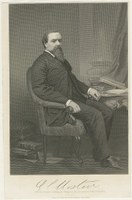
Purchase Tickets
Governor Morton: Much Heralded But Not Elected
February 8, 2013

Gov. Morton is known as the man who guided Indiana during the Civil War. However, he was not the man elected to carry the people of Indiana through the tough times that were brewing during the 1860 election that would shortly develop into the Civil War. As a governor, Oliver P. Morton was seen by many as a strong leader, while others saw him as a political opportunist or much worse. Considering the way that he obtained the governorship of Indiana, both views may be valid.
Henry S. Lane and Oliver P. Morton, competing for their party?s nomination, struck a deal to keep from having a drawn out nomination process that could cause problems during the fall election. In the event that the Republican Party took over the Indiana General Assembly and won the governorship, the governor, Lane, would be elevated to the U.S. Senate and Morton, the lieutenant-governor, would take over as governor. Henry S. Lane, 13th governor of Indiana, was in office for two days.
Only one four-year term was possible within an eight-year period during Morton?s tenure as governor. Morton, however, ran and attained a second term because he had not been elected to the position in 1860. Regardless of the length of his predecessor?s governorship, Morton had not served a full four-year term. Because he wasn?t technically elected to that first term, the governor who took us into the Civil War was able to see us through to the end of the war. Interestingly enough, Morton never served a full four-year term he was elected to the U.S. Senate in 1867 and served in that capacity until his death in 1877.
For more information about Oliver P. Morton and other Indiana governors, see The Governors of Indiana published by the Indiana Historical Society.
____________________








